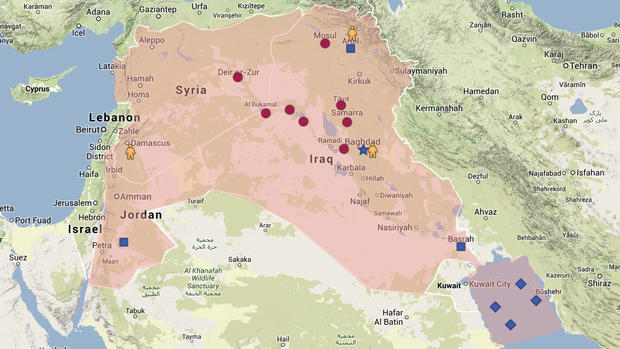Big Oil gets more workers out of Iraq
Exxon Mobil (XOM) and BP (BP), two of the world's largest oil companies, have reportedly evacuated employees from Iraq, the latest sign of the growing unease by multinational corporations about the swiftly advancing Islamist insurgency in the Middle Eastern country.
According to Iraqi news, Dhiya Jaffar, the head of Iraq's South Oil Co., Exxon Mobil had conducted a "major evacuation," while 20 percent of the staff of BP, Europe's second-largest energy company, had also left the country. Jaffar criticized the moves, arguing the southern area where the oil is produced is far from the fighting.
Richard Keil, a spokesman for Exxon Mobil, told CBS MoneyWatch that the company doesn't comment on security issues. BP declined to comment on a Reuters story about the evacuation as well, though CEO Robert Dudley said yesterday that some "nonessential" personnel had been removed. He wasn't more specific.
Oil-field services companies Baker Hughes (BHI), Weatherford (WFT) and Schlumberger (SLB) are maintaining their current workforces in Iraq, according to Reuters. None of these companies could be reached for comment. Earlier this week, a Baker Hughes spokeswoman declined to discuss its plans for Iraq though she did say the safety of its workers was the company's "number one priority."
Foreign companies have played key roles in rebuilding Iraq's oil industry after the 2003 fall of Saddam Hussein. As The Wall Street Journal noted, the companies have reaped the benefits of their investments, with production at the West Qurna-1 field doubling. Whether that milestone is now threatened is tough to say.
Oil prices have already spiked on the news, pushing Brent crude to a nine-month high recently. The International Energy Administration has slashed its forecast for growth in Iraq's oil production by 470,000 barrels per day. It forecasts that Iraq will produce 4.54 million bpd by 2019, well under the Iraqi government's estimate of 9 million bpd by 2020, according to Reuters.
The insurgency lead by the Islamic State of Iraq and Syria (ISIS) has been mostly overcome the Iraqi Army, which has unnerved the U.S. after spending billions equipping and training the force. According to media reports, ISIS has attacked oil refineries in the country. Foreign companies that do business in Iraq understandably are actively monitoring the situation as it unfolds.
The U.S. government has urged Americans not to travel to Iraq and warned that the civilians there should be prepared to evacuate on short notice. Even during the best of times, working in Iraq is dangerous. The U.S. government urges businesspeople who travel there to hire security, which can cost $4,000 to $7,000 per day.
Fleeing politically unstable countries is nothing new for the oil companies, but it does present many challenges because these facilities don't turn off at a flick of a switch.
"It's more complicated than that," said an oil industry analyst who declined to be named. "Usually what they try to do is to leave a skeleton crew ... They may pull the expats and leave the Iraqi employees to run the field."
Although the Iraqis could keep the fields running for a while, he said, they probably wouldn't be able increase production significantly without the assistance of foreign oil workers.
